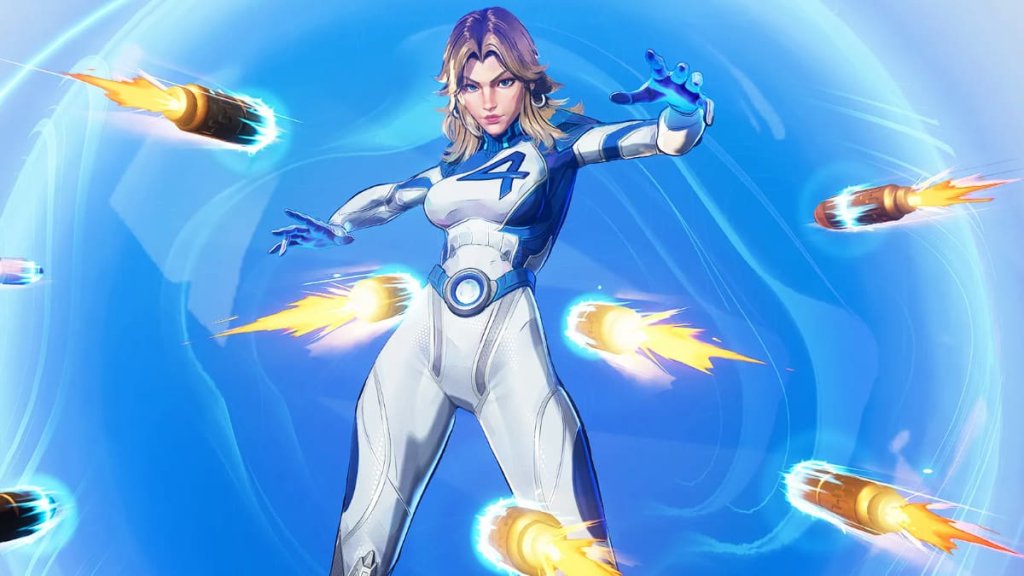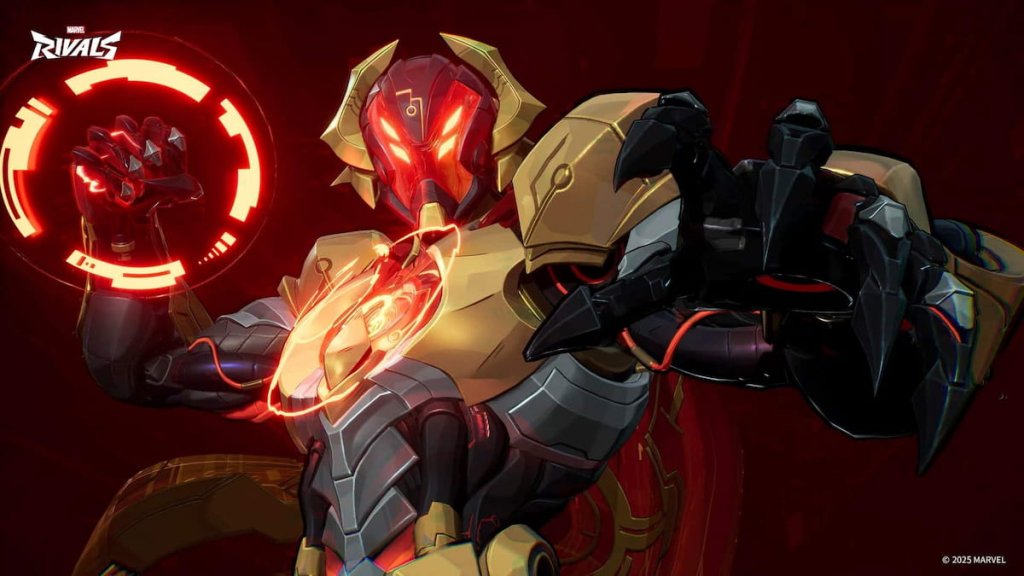
Analysing Gaming Burnout and How it Affects Player Mentality and Fortitude
Gaming burnout is a prevalent issue in the esports industry as well as the broader gaming world. Doing one thing on a repeated basis, no matter how interesting, will eventually start to get stale and boredom will begin to creep in. Now imagine how exacerbated this issue is in esports where pro players have to train constantly, often for more than 10 hours each day.
Self-Care and Burnout in esports have been talked about, but not properly addressed or studied at large. With an industry as large as this, it’s not easy finding a solution that makes everyone happy. While some advancements have been made, players are still put under a lot of stress, and they have to play their respective games even if they don’t feel like it.
Gaming burnout affects millions of players worldwide.
Common symptoms include fatigue, irritability, increased stress, and lack of interest.
Burnout can be dealt with by stopping playing games for a while or changing them to games you’ve never played.
Pro esports players suffer from burnout a lot more than players in regular sports.
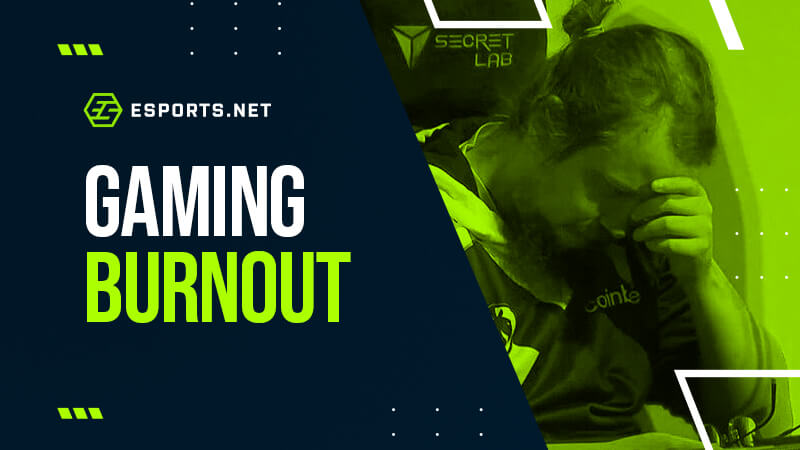
What is Gaming Burnout?
Gaming burnout is the result of excessively playing one game even if it isn’t enjoyable anymore. Speedrunners are a great example of this. They will push themselves to the absolute limit in an effort to achieve the best time(s) possible. Most of them will drop the game completely after they’re satisfied with their success, because it’s become the focal point of their lives. The same can be said for all gamers.
If you obsess over a game, finishing it will feel great, but you’ll also feel completely empty inside, at least for a while. Now multiply that by a factor of a hundred for multiplayer games where stress and disagreements are common, things don’t go your way, and it’s easy to see why gaming burnout appears ‘out of nowhere’. Professional players are contract-bound to perform to the best of their ability, which means they’ll put in many more hours than the Average Joe, and ultimately that may not be enough to win. Once that downward spiral of burnout and lack of confidence begins, it can be extremely difficult to get out of, hence why most esports players have personal psychiatrists and doctors to advise them.
But you, as a casual gamer, have to learn how to deal with it yourself since you do not have a contract with a pro team and can do as you wish!
Gaming Burnout Symptoms
Everyone experiences burnout differently so not all gaming burnout symptoms will apply to everyone. But these are the most common and if you have at least two, it may be time to sit down and reevaluate how you play games and if it’s too much:
- Physical or Mental Exhaustion: Whatever game you’re playing, your brain shifts it into higher gear so your focus, reactions, and problem-solving skills are enhanced. However, being in this elevated state drains additional energy, which is why after a few highly competitive multiplayer matches you feel so exhausted. On top of that, you’ll be playing games in one bodily position the entire time, with a few seating adjustments. This can lead to cramps and muscle fatigue.
- Lack of Interest: If you’re looking at your desktop (or console game collection) and are unable to choose which game to play because everything feels kind of like ‘ehh whatever’ – that’s the lack of interest at work. You know, having hundreds of unplayed games in your Steam game library. Playing because it’s a habit just makes all the other symptoms worse, so switch things around, or stay away from games for a while to reset.
- Worsened Gaming Performance: If you feel like you’re forced to play a game, your enjoyment will basically be non-existent and you’ll have trouble performing as your usual self. This is a common symptom for professional esports players as well because they especially experience burnout. But they don’t really have a choice since they are contractually obligated to perform. The good news is that in recent times, players have been given days off to combat gaming burnout because bad performances with uninterested players is an unsustainable competitive business model.
- Increased Stress and Irritability: Stress increases as you get more tired while doing things you’re not enjoying. Think of having a bad day at work where every hour feels worse. This can lead to situations where you lash out at friends or pro players getting triggered during a competitive match. Stress clouds your judgement and will eventually cause anger, so it’s like a vicious circle of burnout.
And don’t worry too much if you experience these symptoms. Gaming burnout is not permanent and you will definitely be able to get back to your favourite games in no time. Here’s what a few Reddit users had to say:
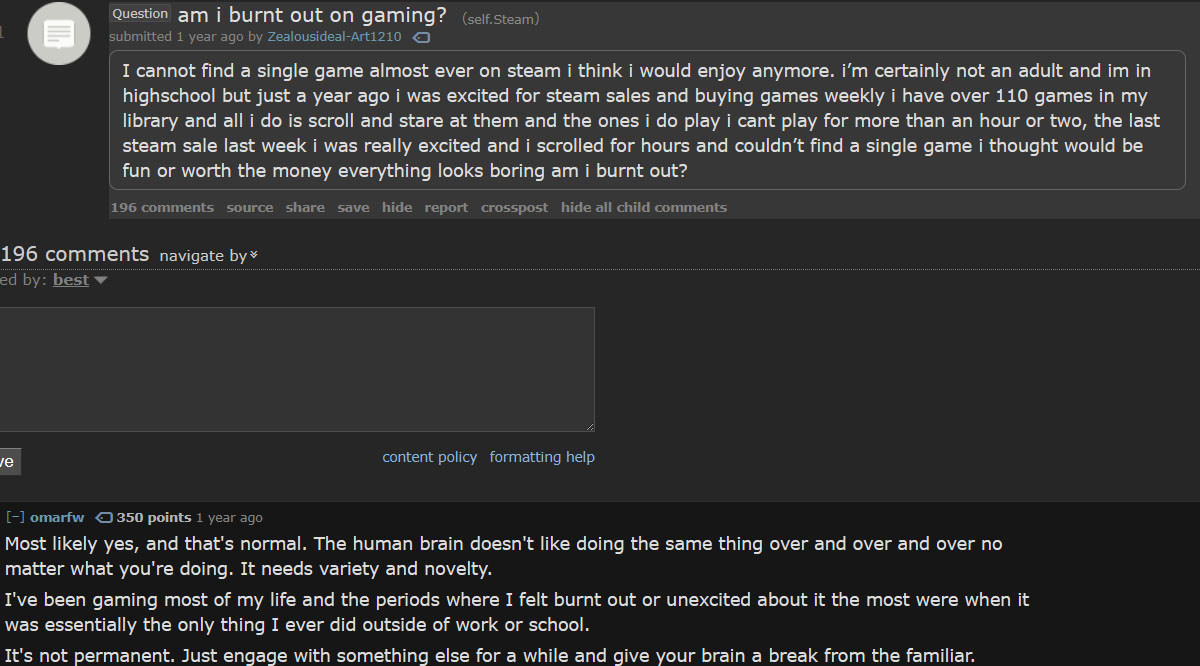
How to Deal With Gaming Burnout?
When it sets in, gaming burnout can be problematic to get rid of. However, it’s not impossible nor too difficult; just time-consuming. Since burnout starts appearing due to excessive periods of doing the same thing over and over again, you need to break that cycle in one of multiple ways. It’s also worth noting that it influences everyone differently, so certain methods may not work for you.
- Expand Your Gaming Genre Horizons: The best way to deal with gaming burnout is to add more games from other genres to your repertoire. This will keep things fresh and exciting, and you might slowly
- Make Your Playing Sessions Richer: Gaming burnout symptoms often include tiredness, unwillingness to play, and boredom. This stems from repeated play sessions where it feels more like a grind than an enjoyable experience. You can try enhancing your sessions by making yourself more active. For example, if you play Red Dead Redemption 2, instead of rushing through the game or trying to go for 100% completion with full conviction, focus on the minute details of the game. Stay and listen for a while. Immerse yourself in the game’s universe. Variety is important in breaking up the monotony.
- Turn Your Attention Elsewhere From Gaming: We’ve all been there – you’re trying to play some games day after day but it you just don’t feel anything and it turns into a chore. If nothing else helps, you may need to step away from games for a while. To reset. Focus on any other hobbies that you have, or better yet, take a walk in nature. The Natural Medicine Journal says that a 1-hour walk in nature boosts creativity and reduces stress. Try to get yourself into a position where you’re absolutely ITCHING to play something. And then resume your orderly gaming activities until the next gaming burnout moment!
- Do Not Use Social Media While Playing: It goes without saying that any recurring short-attention-span activity will affect your gaming enjoyment because you won’t be able to focus on content that needs you to stay engaged. Imagine you’re in the middle of a ranked CS2 match and you receive a Reddit notification that someone commented on your post. You should be ignoring that until the match is done, but nowadays, our attention spans are so short that something as ‘harmless’ as a notification will derail our whole train of thought. Also, social media is packed with game spoilers (if the game has a story) that you’ll inevitably and accidentally ruin the surprise for yourself. In short, keep off social media while you’re playing.
To summarise, it’s best to develop healthy gaming habits so you don’t overdo it, as is the story with everything else in life. Keep it in moderation, and you’ll feel like you’re a kid again, playing with childlike awe and wonder!
How to Avoid Gaming Burnout
Learning how to avoid gaming burnout altogether is a crucial component of the aforementioned healthy gaming habits. If you’ve been playing the same MOBA or MMORPG for a long time and are feeling like the fun is slipping away, your best bet would be to broaden your game scope. Try out some simulator games, or maybe a new dungeon crawler. You may just find another genre that suits you, which means you’ll have at least one more game in your collection to freshen things up.
You may also want to keep your gaming hours limited; for instance if you’re an avid gamer, stopping after 6 hours of play might be a good idea. You can even split those hours into multiple segments so you have things to do in-between, and then go back to gaming. It’s all about organising your time so that each time you play, you’re doing so because you want to play, not because it’s a habit.
Reddit user ‘Independent_Tie_4984’ has shared some of his wisdom with the younger generation and it’s very useful advice. Take a look:
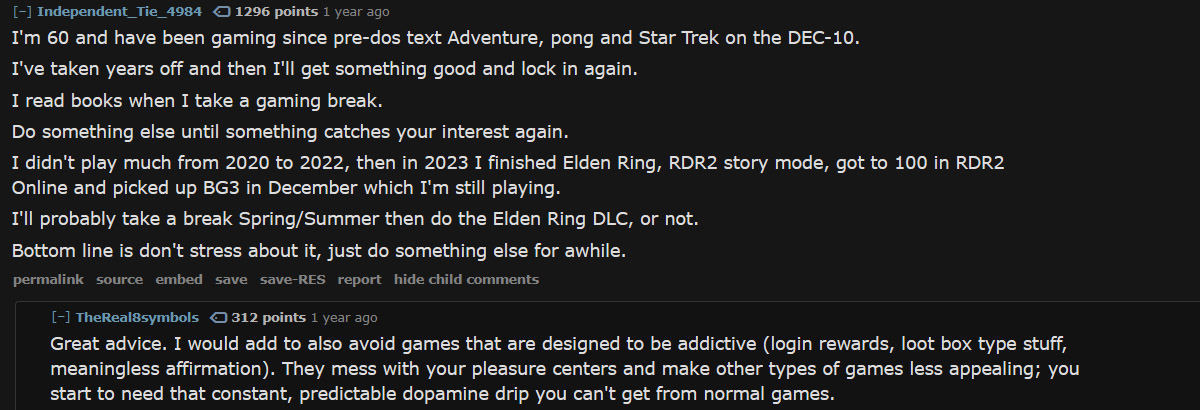
‘TheReal8symbols’ also has the right idea.
Gaming Burnout in Esports
The World Health Organization (WHO) defines burnout in the International Classification of Diseases (ICD) as the following:
“Burn-out is a syndrome conceptualized as resulting from chronic workplace stress that has not been successfully managed. It is characterized by three dimensions:
- Feelings of energy depletion or exhaustion
- Increased mental distance from one’s job, or feelings of negativism or cynicism related to one’s job
- Reduced professional efficacy”
WHO does not define burnout as a medical condition.
Across all esports, players generally play two or more official matches per week. On top of that, there are countless hours of practice and scrims in between. For important tournaments or playoffs, there is additional pressure and stress. Compared to traditional sports, the lack of strenuous physical activity means teams have less incentive to take breaks for the players’ well-being. A player’s career might last 6 or 7 years with only as little as three weeks of off time in that time period.
All of this contributes to an extremely stressful environment primed for burnout. The list of high-tier esports athletes who completely burn out is expanding almost daily nowadays.
Who Has Experienced Burnout In The Past?
Both Lukas “gla1ve” Rossander and Andreas “Xyp9x” Højsleth of the Danish team Astralis stepped down in May 2020. They named burnout as a critical factor in their decision.
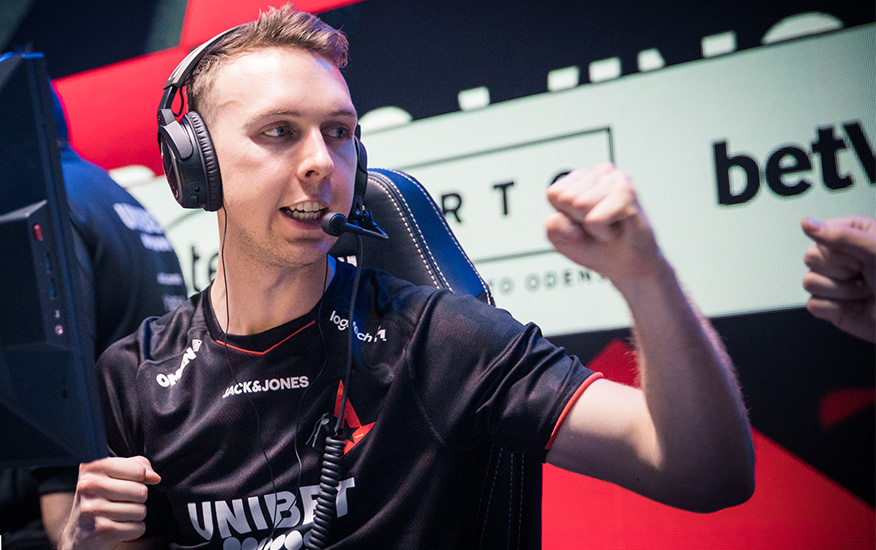
Image Credit: Astralis
Gla1ve said in his Twitlonger announcement:
“For a longer period of time I have had symptoms of stress and burnout. My teammates and the Astralis organization have tried many different things to help me out and overcome this. As it’s still going on, my doctor and I have decided that I need a break, and yesterday I have given a sick note to Astralis.”
Xyp9x also stated:
“I have sadly been feeling burnout/stress symptoms chasing me over many months. It’s time to take the necessary break to rest and find the motivation to get back to competing for Astralis. Everyone around me has done a great number of things in order to avoid it, and there is nothing that I would rather do than keep on playing without a break, but the time has come to take care of my health and therefore I have given in a sick note to Astralis.”
In League of Legends, players have often mentioned burnout and stress as factors that poorly affect their health and play level. For instance, Yiliang Peter “Doublelift” Peng had to take leave from play in 2017 and sat out most of the Spring Split. In an interview with Yahoo Esports later, Doublelift cited stress and burnout as the reasons behind his decision.
Burnout and the intense schedule have also contributed to player injury and physical strain to wrists, forearm flexors, neck and back. Many players have increasingly dedicated fitness time to battle the body fatigue the extended practice sessions cause, yet much work on the fitness front has to be done to address the industry specific physical strains that occur.
What Can Players do About Burnout?
Burnout is a difficult condition to combat, as it is challenging to diagnose. It is easily confused with everyday occupational stresses. Rather than attempting to address current burnout, it is best to handle it with preventative measures. The fundamental difficulty that esports players face is that the more successful a team becomes, the more likely the players will face burnout. The most successful and prolific teams must effectively compete for ten to eleven months, with only occasional brief breaks. And even during these breaks in the schedule, they still need to maintain form.
In an interview with HLTV.org in 2020, Kirill “Boombl4” Mikhailov of Natus Vincere said:
“It’s really difficult to achieve stability in CS. You can win a few tournaments in a row and then lose just one, leading you to think that you’ve become worse… In essence, the only team to have achieved stability was Astralis, and even then, that led to certain players experiencing burnout and taking leave as a result.”
Richard Lewis reported that the Astralis management was culpable for poorly protecting the players’ mental health. According to Lewis, the Astralis players had to threaten legal action to receive their sick leave.
At the end of the day, players need more protections and more time off to get out of gaming burnout. The teams have to understand that performing at a high level doesn’t just require consistent practice and scriming, but also rest. If a player can’t think clearly, they won’t be able to react and adapt to the situation in a match, therefore leading to worse performance.


